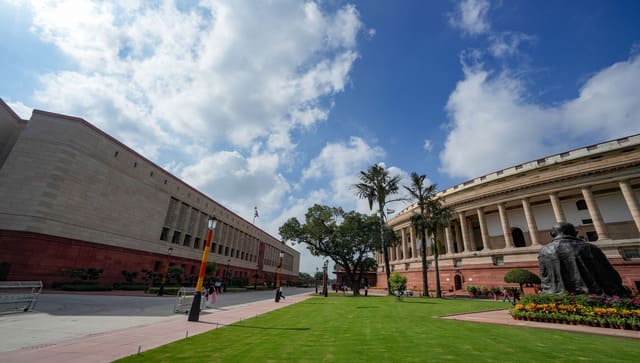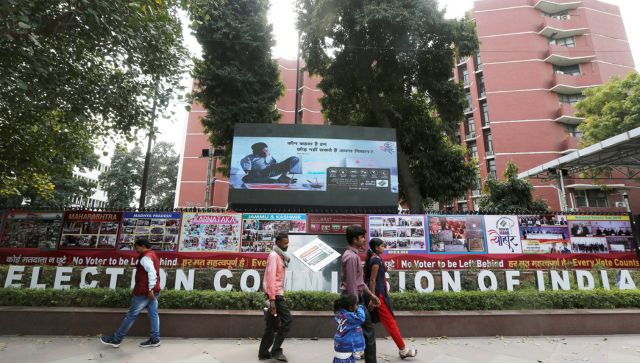The Central government may not bring the contentious Bill on the appointment and service conditions of the Chief Election Commissioner (CEC) and other Election Commissioners (ECs) for discussion and passage during the ongoing five-day special session of Parliament. As per a report in NDTV, the Bill was missing from the list of eight Bills presented by the government to the Opposition at the all-party meeting on Sunday (17 September). The Centre is mulling amending the Chief Election Commissioner and Other Election Commissioners (Appointment, Conditions of Service and Term of Office) Bill, 2023, sources told the news channel. Earlier, the proposed legislation was among the four Bills listed by the Lok Sabha Secretariat to be taken up in the special Parliament session.
The controversial Bill was introduced in the Rajya Sabha on 10 August. What does the Bill say? Why are there concerns about it? We explain. What is the ECs Appointment Bill? The Bill plans to amend the salary, allowance, and service conditions of the CEC and two ECs to make it equal to those of a Cabinet Secretary. Currently, the Election Commissioners are at par with a Supreme Court judge in these facets. The proposed legislation will repeal the Election Commission (Conditions of Service of Election Commissioners and Transaction of Business) Act, 1991. According to Indian Express, while the salaries of a Supreme Court judge and the Cabinet Secretary are almost similar, the apex court judges get more post-retirement benefits, such as lifetime provision of domestic help and drivers. The Bill also seeks to form a selection committee comprising the Prime Minister as Chairperson, the Leader of the Opposition (LoP) in Lok Sabha and a Union Cabinet minister nominated by the PM to pick members of the Election Commission of India (ECI). Concerns regarding the Bill The Opposition has raised objections to the proposed Bill over the selection panel. As per the news agency PTI, several Opposition leaders dubbed the Bill “anti-constitutional” and “anti-democratic” at the all-party meeting convened by the government on Sunday. Official sources told the news agency that the government is reconsidering whether to push the Bill in the Lok Sabha during the special session. The Opposition, including Congress, Trinamool Congress, Aam Aadmi Party (AAP) and Left parties, had caused a stir in the Rajya Sabha over the appointment of top poll body officials when the Bill was tabled by Union law minister
Arjun Ram Meghwal
in August, accusing the Centre of “diluting and overturning” the top court’s order. In March, a five-judge bench of the Supreme Court said in its ruling that a panel comprising the PM, the Leader of Opposition in Lok Sabha, and the Chief Justice of India (CJI), shall select the CEC and ECs. [caption id=“attachment_13137502” align=“alignnone” width=“640”] The Centre may not bring the bill on the appointment of top election officials during the special session of Parliament. PTI[/caption] However, the proposed legislation replaces the CJI with a Union Cabinet minister as a member of the selection committee. There are anxieties that the Bill would give an advantage to the ruling party at the Centre to pick the top election officials as the Cabinet minister would hardly go against the PM, making the LoP’s views insignificant. Another contentious point in the Bill is the “downgrading” of the service conditions of the ECs to that of a Cabinet Secretary – a bureaucrat. “Being seen as the equal of a Cabinet Secretary means you’re even below an MoS (Minister of State) in stature. How do you think that will play out when the Commission tries to discipline a Union minister for violations during an election,” a source told Indian Express. The source said that when election commissioners summon government officers, their order seems to “carry the authority of a Supreme Court judge”. “How do you think it will affect their (ECs) command and control if they are seen as equal to Cabinet Secretary,” the source added. “Since the CEC and the
EC
s will be equivalent to the Cabinet Secretary and not a judge of the Supreme Court, they may be treated as bureaucrats. It can be a tricky situation during the conduct of elections,” a functionary was quoted as saying by PTI. Activists and civil society members have also questioned the Bill over the autonomy of the poll body. Speaking at a webinar organised by non-governmental organisations Satark Nagarik Sangathan and ANHAD on Sunday, former CEC SY Quraishi said the proposed Bill was “defeating the purpose of a collegium” and called its “downgrading” of the election commissioners as “shooting ourselves in the foot”. Quraishi told News18 that the proposed Bill would also lower the “status” of the election commission.“The ECI has a very special constitutional role. Firstly, the CEC and Election Commissioners can take actions against the politicians. When you are equivalent to the Supreme Court judge, you have different authority and status but when you are a bureaucrat, it is totally different,” the ex-CEC explained. Speaking to Indian Express, a former CEC said on the condition of anonymity that there was “effective downgrading as the EC was put on the same pedestal as the bureaucracy”. Calling it a “dilution of the authority of the EC”, the former CEC said that the “political class cannot be disciplined by civil servants” under the proposed legislation. Acknowlgeding the fears about the independence of the ECI, political analyst Sanjay Kumar pointed out that before the apex court’s ruling, the Centre could essentially select the CEC and ECs. “I don’t think this change alone will lead to an end to free and fair elections. Largely elections have been free and fair. I don’t buy this argument that entire elections are managed,” he was quoted as saying by The Hindu. Meanwhile, as per Times of India (TOI), nine former CECs wrote a letter to Prime Minister Narendra Modi on Saturday urging him to stop the “downgrade” of the status of ECs to a Cabinet Secretary. “Bringing their status down to that of a Cabinet Secretary will be somewhat anomalous in light of that constitutional provision (Article 325),” they reportedly wrote. With inputs from agencies
The Centre may not bring the bill on the appointment of top election officials during the special session of Parliament. PTI[/caption] However, the proposed legislation replaces the CJI with a Union Cabinet minister as a member of the selection committee. There are anxieties that the Bill would give an advantage to the ruling party at the Centre to pick the top election officials as the Cabinet minister would hardly go against the PM, making the LoP’s views insignificant. Another contentious point in the Bill is the “downgrading” of the service conditions of the ECs to that of a Cabinet Secretary – a bureaucrat. “Being seen as the equal of a Cabinet Secretary means you’re even below an MoS (Minister of State) in stature. How do you think that will play out when the Commission tries to discipline a Union minister for violations during an election,” a source told Indian Express. The source said that when election commissioners summon government officers, their order seems to “carry the authority of a Supreme Court judge”. “How do you think it will affect their (ECs) command and control if they are seen as equal to Cabinet Secretary,” the source added. “Since the CEC and the
EC
s will be equivalent to the Cabinet Secretary and not a judge of the Supreme Court, they may be treated as bureaucrats. It can be a tricky situation during the conduct of elections,” a functionary was quoted as saying by PTI. Activists and civil society members have also questioned the Bill over the autonomy of the poll body. Speaking at a webinar organised by non-governmental organisations Satark Nagarik Sangathan and ANHAD on Sunday, former CEC SY Quraishi said the proposed Bill was “defeating the purpose of a collegium” and called its “downgrading” of the election commissioners as “shooting ourselves in the foot”. Quraishi told News18 that the proposed Bill would also lower the “status” of the election commission.“The ECI has a very special constitutional role. Firstly, the CEC and Election Commissioners can take actions against the politicians. When you are equivalent to the Supreme Court judge, you have different authority and status but when you are a bureaucrat, it is totally different,” the ex-CEC explained. Speaking to Indian Express, a former CEC said on the condition of anonymity that there was “effective downgrading as the EC was put on the same pedestal as the bureaucracy”. Calling it a “dilution of the authority of the EC”, the former CEC said that the “political class cannot be disciplined by civil servants” under the proposed legislation. Acknowlgeding the fears about the independence of the ECI, political analyst Sanjay Kumar pointed out that before the apex court’s ruling, the Centre could essentially select the CEC and ECs. “I don’t think this change alone will lead to an end to free and fair elections. Largely elections have been free and fair. I don’t buy this argument that entire elections are managed,” he was quoted as saying by The Hindu. Meanwhile, as per Times of India (TOI), nine former CECs wrote a letter to Prime Minister Narendra Modi on Saturday urging him to stop the “downgrade” of the status of ECs to a Cabinet Secretary. “Bringing their status down to that of a Cabinet Secretary will be somewhat anomalous in light of that constitutional provision (Article 325),” they reportedly wrote. With inputs from agencies
)